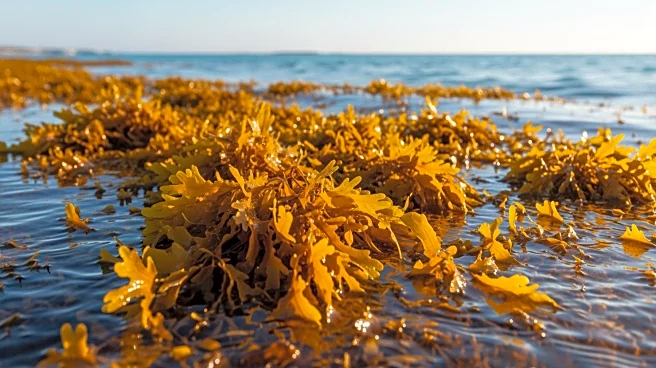What's Happening?
A team of international researchers led by the Max Planck Institute for Chemistry has identified the primary process driving large-scale Sargassum blooms in the Caribbean. These blooms, originating from
the Sargasso Sea, have been increasing since 2011, causing ecological stress and economic challenges for coastal communities. The study, published in Nature Geoscience, reveals that strong wind-driven upwelling near the equator brings phosphorus-rich deep water to the surface, benefiting cyanobacteria that live on the surface of the brown algae. These microorganisms capture atmospheric nitrogen gas and convert it into a form usable by Sargassum, a process known as nitrogen fixation. This symbiosis provides Sargassum with a competitive advantage over other algae, explaining the changes in abundance recorded in past years.
Why It's Important?
The findings are significant as they offer a clearer understanding of the factors contributing to the growth of Sargassum blooms, which have ecological and economic impacts on Caribbean coastal regions. The blooms discourage tourism due to their unpleasant smell and stress local ecosystems. Understanding the mechanisms behind these blooms can help in developing predictive models to anticipate future occurrences, allowing for better management and mitigation strategies. This research also highlights the role of climate patterns in influencing marine ecosystems, emphasizing the need for ongoing monitoring and adaptation strategies in response to global warming.
What's Next?
The research team plans to expand their analysis by examining new coral records from multiple locations throughout the Caribbean. These insights are expected to support efforts to protect coral reefs and help coastal communities manage the growing impacts of Sargassum blooms. Monitoring wind conditions, sea surface temperatures, and associated upwelling patterns in the equatorial Atlantic will refine predictions of future Sargassum growth, aiding in the development of effective response strategies.









